Stupid Cupid: How Dating Apps In India Have Become Crime Epicentres

“Until con do us part.”
The original phrase, “until death do us part,” has been modified here to reflect love in the digital age, with Indian dating apps now becoming a breeding ground for deceit, manipulation, blackmail, infidelity, extortion and, at times, murder, besides helping people find love.
If you find these allegations quite startling, then consider the findings from global cybersecurity firm Norton last year, which revealed that 66% (two-thirds) of adults using dating platforms in India fell victim to various forms of financial fraud related to dating app scams.
Regarding malicious pictures, threats, cheating and other unethical practices rampant on dating apps, the Norton report reveals that an average fraud on such apps can cost a person a minimum of INR 7,996.
How much of this is true, what is the root cause of this growing rot and why are dating apps operating in India conspicuously silent about their platforms turning into hotbeds for such crimes?
To find answers to these questions, our investigation led us to Rohit, a 25-year-old man whose blind date took a wrong turn.
Swipe Right To Get Honeytrapped
In his prime and raging with hormones, Rohit, single but ready to mingle, met Avani (23) on an Indian dating app. Soon, their conversation on the dating app broke all barriers and became explicitly sensual. Now, the two had to meet at all costs.
Therefore, they decided to see each other at a pub in Delhi’s Connaught Place. However, the day that looked like rainbows and sunshine soon got shrouded in ominous clouds for Rohit.
For starters, Rohit’s date started burning holes in his pocket in just a few hours, making him cough up as much as INR 50K at the pub where they were having their first-ever tryst.
Then, the real gambit started. After a few drinks, the Avani started blackmailing her date, accusing him of raping and sexually harassing her and threatening him with lodging a police complaint against him.
There was no way out for Rohit, as Avani had a record of their intimate conversation on the dating app, the images shared by him and everything that could be used to blackmail him.
Rohit tried to evade but found himself deep in the quicksand of the online dating trap. Much was at stake for Rohit, ranging from his reputation in society to his job and future.
Therefore, the beleaguered Romeo struck a deal with his newly found Juliet, leading to the entry of another man in the skillfully crafted game of right swipes.
Rohit soon got a call from Avani’s acquaintance, Vikas, who introduced himself as a social activist. Vikas outrightly demanded a few lakh rupees to avert the legal action against him.
Luckily, as Rohit was contemplating his options to have a narrow escape from the situation, he coincidently stumbled upon a human rights activist, Deepika Narayan Bharadwaj.
After Rohit expressed his ordeal, the activist informed him that he had been honey-trapped by a nefarious nexus that was running unchecked. This network duped single men seeking love on dating apps, baiting them into in-person meetings with single women, capturing their intimate moments, and subsequently blackmailing them with accusations of rape and harassment.
“Even some pubs in Delhi operate in connivance with these groups, which are led by people like Avani and Vikas, the key conspirators,” Bhardwaj told Inc42 in an exclusive interaction.
Sinners On The Loose
For the last two years, Bhardwaj has been spending time and efforts to sensitise people, especially men, against falling into the “right swipe” trap. Despite her efforts, crimes involving dating apps are on the rise, with men increasingly falling victim to predators like Avani and her accomplices.
Rohit’s case is just one of the many instances happening across the country. An increasing number of cases related to cheating via the dating app route are emerging almost daily from all corners of the country.
While in some instances, men like Rohit are coerced into paying inflated restaurant bills, the internet is brimming with reports of extortion, kidnappings, and even killings of individuals who have fallen victim to exploitation facilitated by these dating apps.
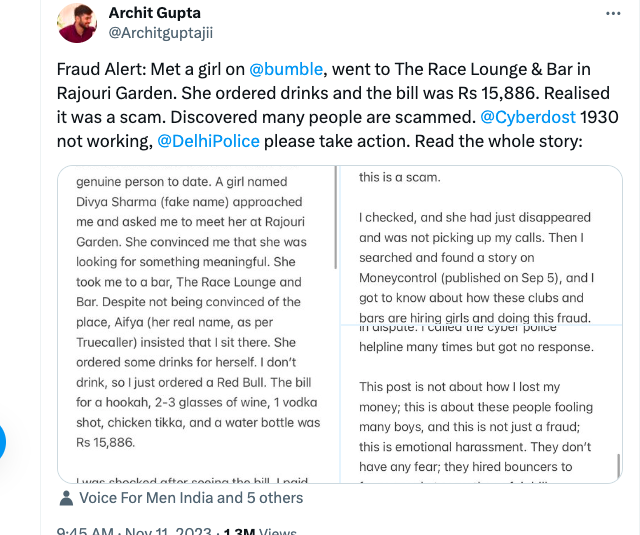
Speaking with Inc42, Bharadwaj shared an example wherein a 28-year-old man from Jaipur was abducted and subsequently found hacked into pieces in a suitcase.
Delving into the details of the case, Bharadwaj revealed that the Jaipur resident, Dushyant Sharma, met Priya Seth on Tinder. Sharma impersonated a rich person on the dating platform, which piqued Seth’s interest, as she was already seeking a target for kidnapping and subsequent extortion, in connivance with her boyfriend and one other.
Three months after talking to each other on the dating app, the duo decided to meet at Seth’s apartment, where the woman was ready with her two accomplices to kidnap Sharma.
Following the abduction, Sharma was forced into contacting his father to arrange a ransom of INR 10 Lakh in exchange for his freedom. Tragically, before the victim’s father could arrange the funds, the perpetrators callously murdered Sharma and dismembered his body, stuffing the remains into a suitcase, which was later found in a village outside Jaipur.
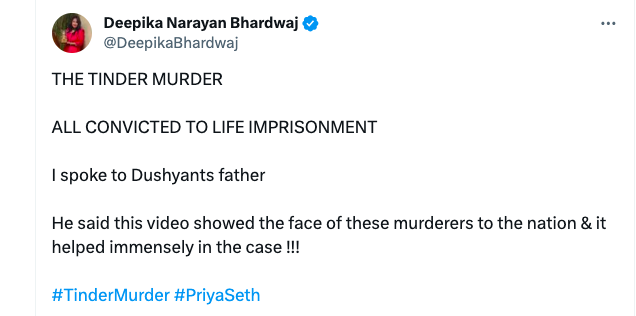
In a separate incident, Pune police apprehended a man and a woman in their mid-twenties last year for swindling individuals under the guise of romantic encounters.
In one instance, the duo defrauded a realtor of INR 1.5 Lakh after the woman initiated contact with the victim on a dating app and arranged a meeting at a hotel. In another case, the same suspects lured a tax consultant through a dating app.
The modus operandi was similar. The victim was called to a hotel and then coerced into making a UPI transfer of INR 50,000.
At a time when an increasing number of men are being made victims of these heart-wrenching and distressing scams, women, too, are not safe, to say the least.
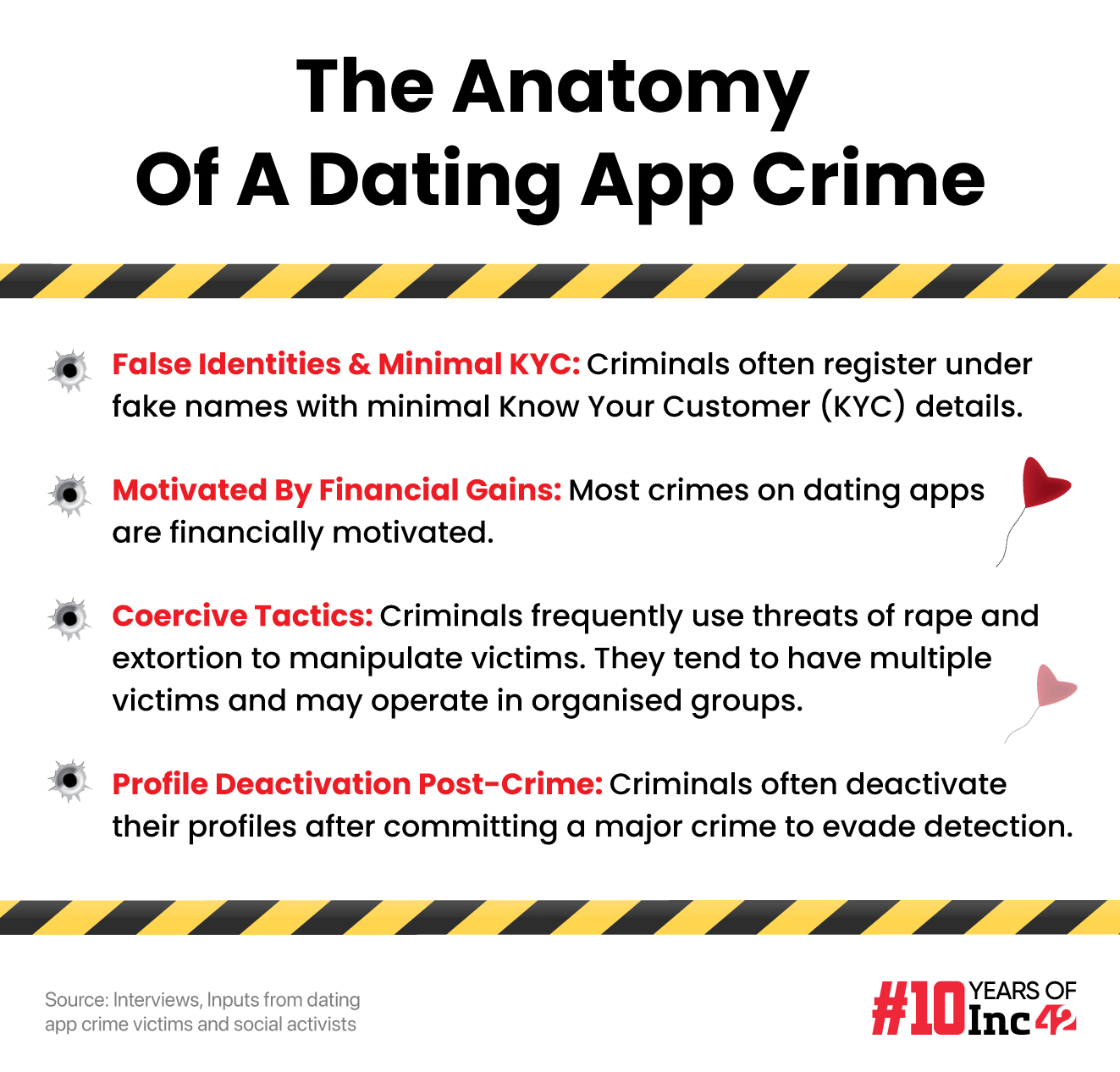
If one recalls the infamous Aftab Poonawala case from last year, a particularly chilling detail emerged — the accused was daringly engaging in dating women on Bumble, a dating app, and inviting them to his home, all while he still had all 35 pieces of his ex-girlfriend’s dismembered body stored in a freezer at his apartment in Delhi’s Chattarpur.
The Indian Dating Landscape
Bharadwaj believes that it is the men who are more vulnerable to being duped via the online dating app route. This is probably because there are more men on dating apps compared to women, and a survey by a homegrown dating app, Woo, reflects the same.
According to a survey done by Woo, there are three times more men on Indian dating apps than women.
However, early stage venture capitalist Rahul Maheshwari, who has also worked with dating platforms, in a blog post (published in May 2023), based on Tinder’s Sentiment Analysis (Playstore reviews for 1 year), stated that the sex ratio on such platforms is even more skewed, with the male-to-female ratio on just Tinder India being 93:1.
The second problem is that these apps are struggling to generate revenues and retain users due to a small presence of women on dating platforms.
Now, in a bid to retain female users, these apps ignore entirely the quality of users that are being onboarded, thereby making these platforms a breeding ground for imposters, fraudsters and criminals.
In December, Zerodha cofounder Nikhil Kamath, in an X post, shared that a dating app in India requires to spend up to $10 (INR 830) to acquire a female user, on average.
On the bright side, however, India is one of the fastest-growing online dating markets globally. This rapid expansion has drawn the attention of US-based Match Group’s Tinder, Hinge, and OkCupid, prompting them to expand their operations in the country.
Moreover, recognising the significant growth opportunities in this sector, indigenous apps such as Aisle and Truly Madly have also emerged. To put things into perspective, online dating apps in India saw their user base swell by a staggering 293% in the last five years to reach 82.4 Mn in 2023.
While users are trickling on these platforms in droves, they are not staying for long. As per an ET report, monthly active users (MAUs) of popular dating apps such as Tinder, OK Cupid, Aisle, and Happn fell by 20-25% between October 2022 and September 2023.
Statista forecasts that Indian dating apps are poised to generate revenues of $104.95 Mn in 2024, primarily driven by the popularity of casual and online dating. However, the metric is anticipated to fall to $98.73 Mn by 2028. When factoring in matchmaking apps and websites, the projected revenues are expected to soar to $402 Mn in 2024 and nearly $403 Mn in 2028.
The Statista report distinguishes between casual dating, which involves establishing sexually oriented contacts outside of romantic relationships, and online dating, which encompasses platforms facilitating flirting, chatting, and romantic connections.
Meanwhile, Maheshwari is more optimistic and projects the market size of dating apps in the country to be in the range of $250 Mn – $350 Mn, albeit much lower than their Western counterparts.
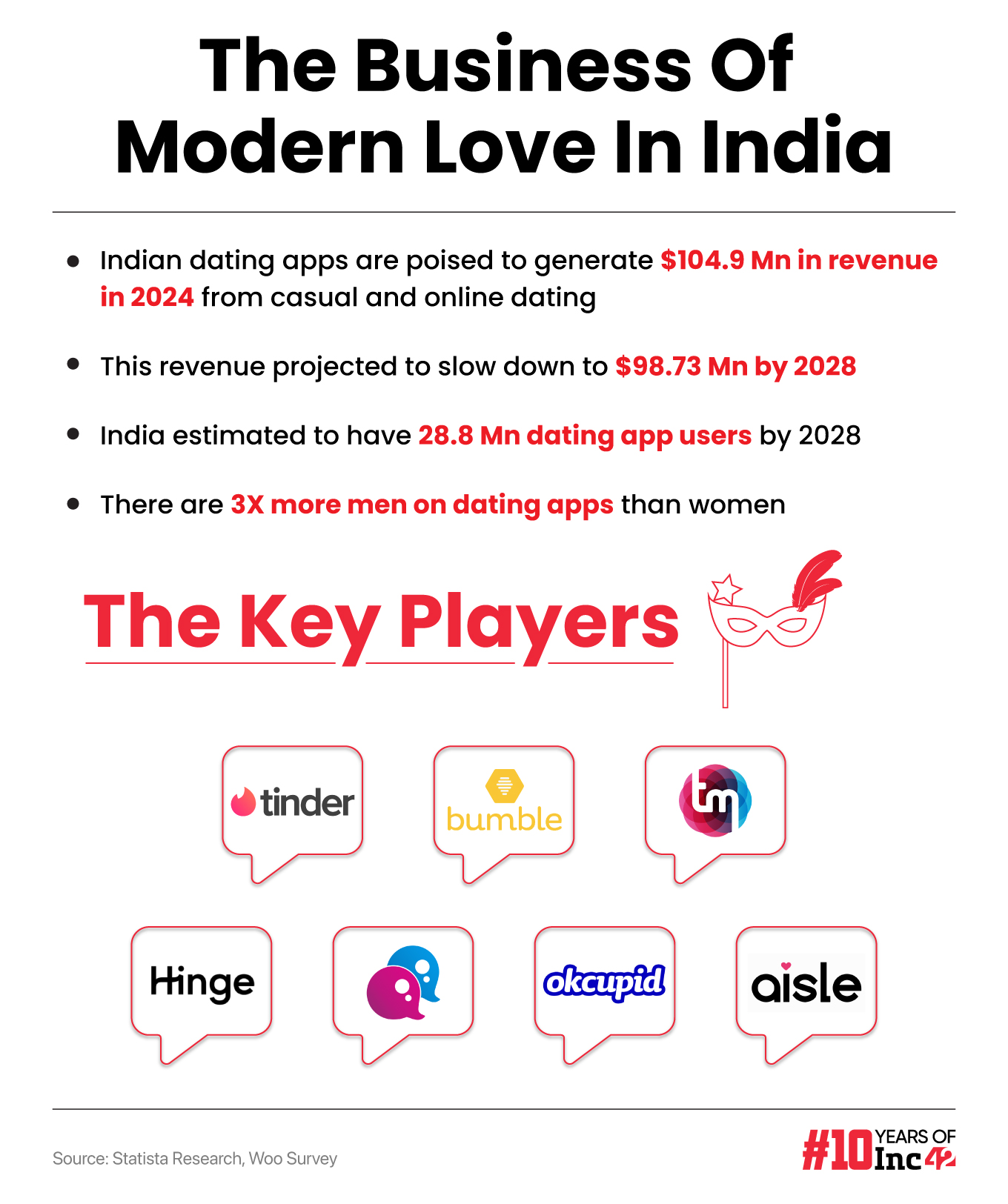
A C-suite executive who works at a Bengaluru-based matchmaking company told Inc42 that the increase in the user base of these apps is not reflective of their growth as a majority of these new users are non-paying, and hence, their revenues haven’t increased significantly.
No Onus On Dating Apps?
Amid the escalating incidents of crimes facilitated by dating apps in India, the blazing question that begs to be asked is — Why can’t dating apps be held accountable?
It is vital to mention that dating apps come under the purview of India’s Information Technology Act, which mandates digital intermediaries (in this case, the dating apps) to safeguard the privacy of their users, dissuade them from using unethical content (which is again ambiguous), and appoint grievance officers in case of user harassments, among others.
“However, unlike social media platforms such as X and Facebook, dating applications have largely ignored the guidelines, making the latter vulnerable to unethical practices,” the activist said.
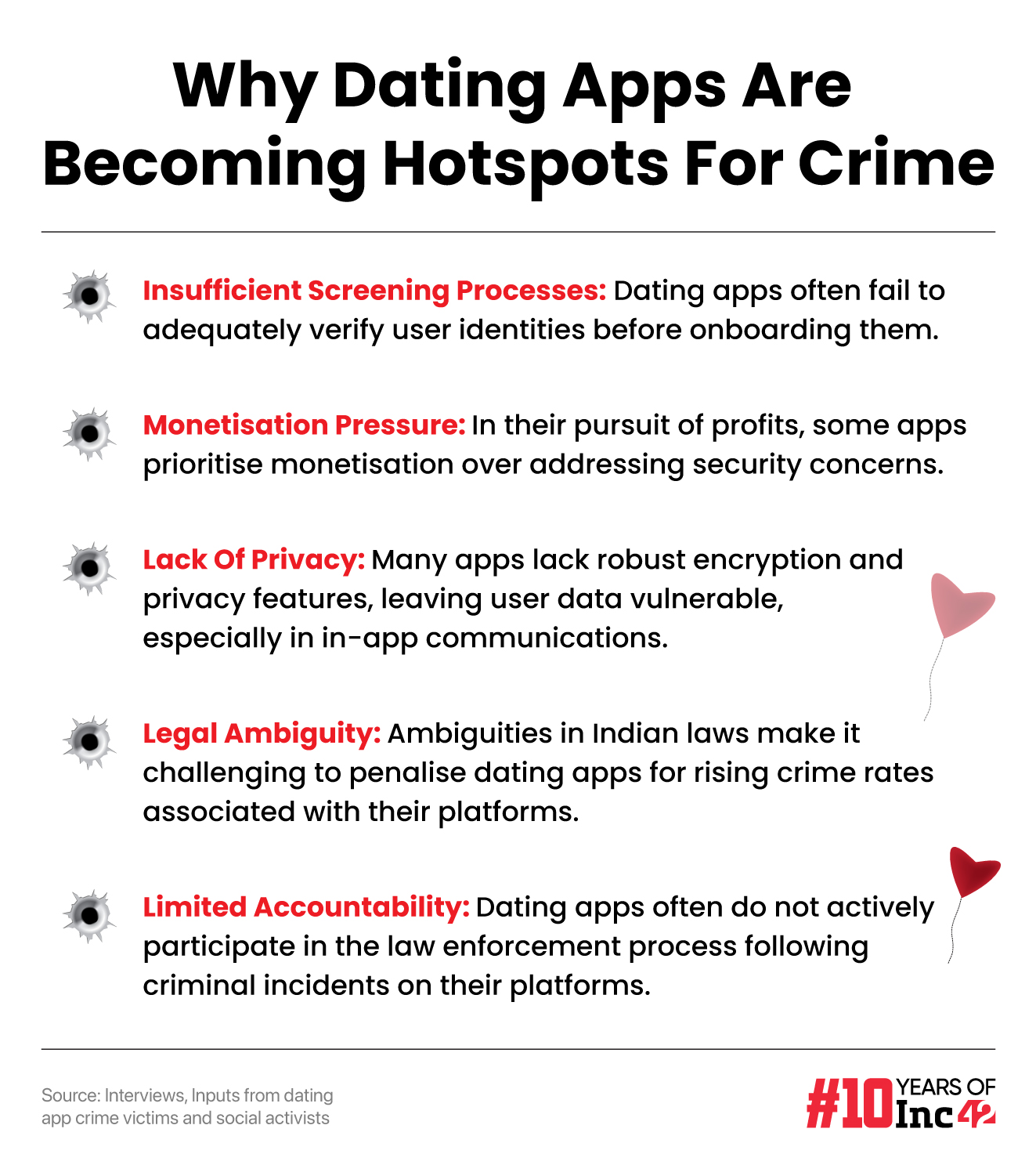
She added that the amount of penalties imposed on dating apps for contravention of rules is so feeble that it doesn’t bring about a change in the ethical code of these dating apps.
“We have also seen instances where the dating apps have not even cooperated with the law enforcement agencies on grave matters, shrugging off responsibility, by saying that the users were aged 18 years and above and agreed to the terms and conditions before signing up,” Bhardwaj said.
Inc42 reached out to various dating apps such as Tinder India, Quack Quack, and Gleeden with queries related to harassment and other crimes that are linked to the apps. None of the apps agreed to participate in the story.
Illusion Of Law?
After facing data leaks and lawsuits globally, dating applications have strengthened their user contracts and privacy policies. However, these have hardly played any role in tackling the rising crime rate emerging from dating platforms in India.
“Apart from subscription-based premium models and advertising, dating apps have little to no monetisation avenues. As such, sharing exclusive data with social media networks such as Facebook, Instagram and other TPAs (third-party apps) becomes crucial to make money,” a top executive working with a Bengaluru-based dating firm mentioned.
Furthermore, linking one’s Facebook and Instagram profiles with dating apps also puts users at increased risk, as their sensitive information could be easily shared and misused.
Some dating apps also access users’ real-time location and IP addresses and display marketing features from third-party applications along with matches and preferences based on geographical locations.
Many global data protection authorities have imposed significant penalties and restrictions on dating apps following an outcry against the way dating apps have been handling and sharing sensitive personal data.
The allegations in various lawsuits, filed against dating apps, range from using the sensitive personal information of users for marketing gains to sharing them with advertisers.
Though dating apps such as Bumble and Tinder have maintained that the collection of such data is consensual, many users have alleged that dating apps in India are not forthcoming about the motives of data sharing and the parties with which they will share such data during the sign-up process.
Surprisingly, India’s newly promulgated data protection law, the Digital Personal Data Protection Act (DPDP), 2023, has vaguely defined the term sensitive personal data. In contrast, however, the European Union’s (EU) General Data Protection Regulations (GDPR) has an overarching and wide definition.
Sensitive personal data under GDPR includes data of racial or ethnic origin, political opinions, religious or philosophical beliefs, or trade union membership. The term also covers the processing of genetic data, biometric data to uniquely identify a natural person, data concerning health, or data concerning a natural person’s sex life or sexual orientation.
As of now, amid the rising number of crimes against single men on various dating apps operating in India, it has become all the more crucial for regulators to tighten their noose on the apps that defy the laws of the land. This regulatory stance is the need of the hour to protect internet users’ privacy.
[Edited by Shishir Parasher]
The post Stupid Cupid: How Dating Apps In India Have Become Crime Epicentres appeared first on Inc42 Media.
No comments